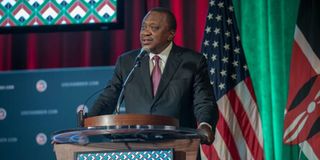Kenya-US trade: What next after Trump?

President Uhuru Kenyatta addresses the Kenya-US Trade Forum in Washington DC.
What you need to know:
- President Donald Trump had approved and kicked off negotiations of a Free Trade agreement with Kenya.
- The Trump administration made Kenya the first country in sub-Saharan Africa to negotiate a bilateral free trade agreement (FTA) with the United States.
You might have asked yourself: What’s the impact of the just-concluded US presidential election on trade and diplomatic relations with Kenya?
Well, we must not forget that President Donald Trump had approved and kicked off negotiations of a Free Trade agreement with Kenya.
We must now wait to see how keen the new administration in Washington will be prepared to conclude the negotiations.
The Trump administration made Kenya the first country in sub-Saharan Africa to negotiate a bilateral free trade agreement (FTA) with the United States. Is there a major prospect of a boost in trade? An FTA with a country such as the US will only make sense to a developing nation when we have enough to export to that country.
But it can only help you when you have demonstrable capacity to ramp up export capacity. It helps where there is room for significant trade-offs. Despite the fact that Agoa gives us preferential access on almost 6,500 items, we have hardly gone beyond textiles and apparel in trade with the US.
I don’t see the government having capacity to execute massive investment in exports in the short-term. Still, I see the Americans pushing for a quick conclusion since FTA is but a tool for coercing small countries into giving preferential treatment to US companies and contractors.
Nairobi-Mombasa Expressway
Washington chooses to negotiate an FTA when they want to pull you into their sphere of influence. The elephant in the room is the growing influence of China in Africa and the stranglehold that Chinese EPC contractors hold over major infrastructure projects on the continent.
The US FTA negotiations with Kenya are coming at a time when the influence of American companies appears to be dwindling even as the Chinese ones continue to clinch the big deals.
A good example is the American construction conglomerate Bechtel that has been gunning for the contract to build the proposed 473-kilometre Mombasa-Nairobi Expressway. Bechtel signed a government-to-government (G2G) deal way back in July 2015 and a commercial agreement with the Kenya National Highways Authority (KeNHA) in 2017.
But the National Treasury and the company are yet to agree on the financing proposal which the Americans have put on the table. The Treasury wants the Americans to build the road using its own money and recover it by charging toll fees to users.
But they are insisting on the conventional route of using state-sponsored credit agencies: Guarantees from American and European export-import banks and borrowings from international capital markets against government books.
The Americans have presented a financial proposal whereby financing will come mainly from US and United Kingdom export credit agencies, including US Exim, US OPIC and UKEF of the United Kingdom
In the energy sector, one of the biggest American investors in the country, private electricity producer Ormat International, has had a rough time with the taxman.
The power producer recently revealed in filings to the Security Exchange Commission of the US that the Kenya Revenue Authority had demanded a whopping $228 million (about Sh22.8 billion) from assessing its operations over 2013-2017. It is understood that the matter is before the tax tribunal.
The American agribusiness multinational Del Monte was armtwisted by the former Governor of Kiambu County, Mr Ferdinand Waititu, to cede 690 acres of land.
Thousands of acres
The deal between Kiambu and the pineapple grower gave neighbouring Murang’a County the impetus to also press the company to cede thousands of acres.
The US-Kenya FTA is going to be the template for negotiations of FTAs with other countries in sub-Saharan Africa with the ultimate objective of checking the influence of Chinese EPC contractors on the continent.
And it is likely to have a major impact on the ongoing politics around negotiations of Africa’s debts.
Last week, China joined major creditors under the G20 group to sign a common approach for restructuring debt owed to African countries.
It was a major development because until recently, the Chinese have been reluctant to accept debt forgiveness — arguing that some its state-owned companies that have lent money to Africa were private companies.
It is believed that Washington and the G20 see in the USA-FTA and opportunity to press for transparency of the external debt register of sub-Saharan African countries.
When Zambia recently sent a notice of sovereign default on Euro bonds, international creditors were surprised to discover that the money had not been invested in hard assets- say a railway or a port.
National finance ministries in Africa do not maintain the country’s national accounts on double entry accrual systems that end up in a general ledger.
The upshot is that it becomes difficult to get clear details such as creditor balances outstanding nor automatic revaluations of any balances denominated in foreign currency.





